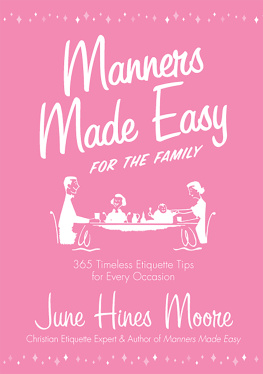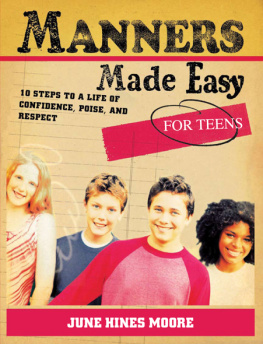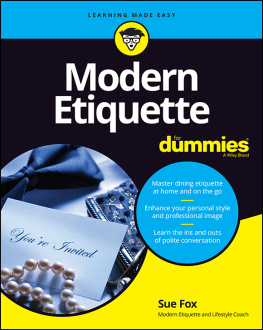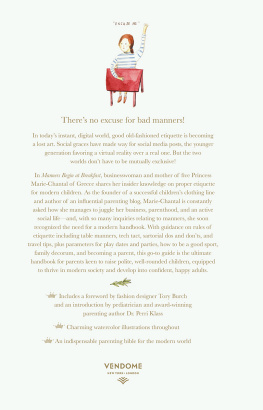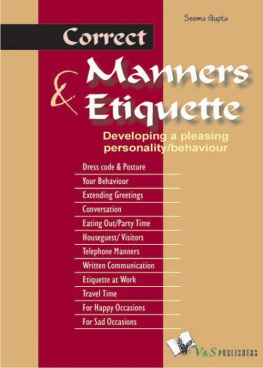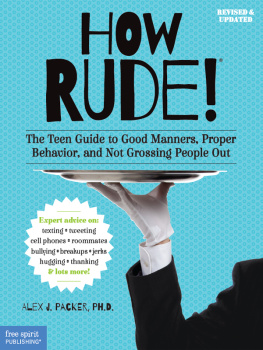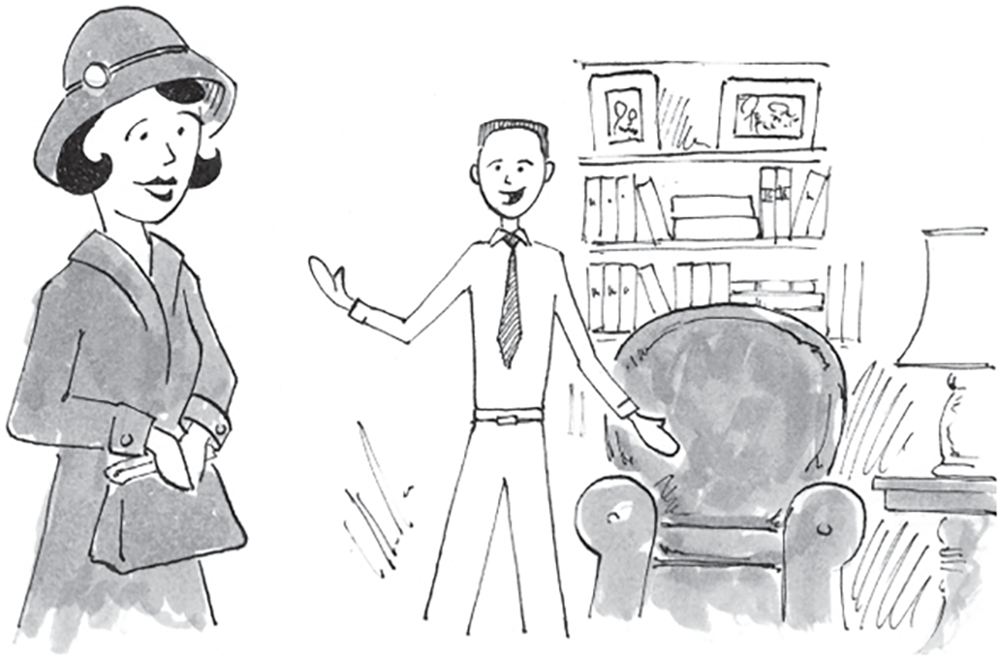Copyright 2008 by June Hines Moore
All Rights Reserved
ISBN: 978-0-8054-4741-5
B & H Publishing Group
Nashville, Tennessee
www.BHPublishingGroup.com
Unless otherwise noted, all Scriptures used are from the Holman Christian Standard Bible (hcsb) copyright 1999, 2000, 2002, 2003 by Holman Bible Publishers. Other versions used include the New Living Translation (nlt) copyright 1996, 2004. Used by permission of Tyndale House Publishers, Inc. All right reserved; The Living Bible (tlb) copyright 1971 owned by assignment by KNT Charitable Trust; The Amplified Bible (amp) copyright 1954, 1958, 1962, 1964, 1965, 1987 by The Lockman Foundation. Used by permission. And the King James Version (kjv).
Dewey Decimal Classification: 395
Manners and Customs / Etiquette / Family Life
Interior illustrations by Abe Goolsby
Printed in the USA
1 2 3 4 5 6 7 12 11 10 09 08
Dedication
To my husband, Homer,
who is my greatest inspiration.
To my family,
Greg, Jeff, Leslie, Laura Beth, and Mary Cate.
To all the students I have had the privilege to teach.
With special recognition to my computer tech, Tim Joiner, who serves as my brain and my hand when mine refuse to solve my computer problems, which are legion at times.
W e put rules of etiquette in our head
and manners in our heart.
The rules guide our behavior and keep
us from embarrassing ourselves.
The manners in our heart keep us from
embarrassing someone else.
Introduction
Manners Were God's Idea First
Every member of every family has mannersgood or bad. Our good manners show consideration for the feelings of others, while our bad ones reveal thoughtlessness and rudeness. We can't touch them or see them. We get our manners by default, but not by birth. Even members of the royal family must learn good manners.
But if we can't touch or see them and we are not born with them, then where did they come from? Manners were God's idea first.
All manners, both socially and in business, are based on the Bible, especially on Luke 6:31 where God gave us the Golden Rule: Do for others as you would like them to do for you. From this beginning, manners touch everything we do in life.
If you have ever dined with a two-year-old, for example, you know why we have table manners. As one of my young students said, "It's so we don't gross somebody out." Truth is, we learn our manners at home from our families. And just as we do not send out our family without rules of safety, such as "walk facing traffic," we do not want them to go out with bad manners (and maybe not even know it).
Good manners are more than knowing which fork to use or which way to pass food around the table. There are the etiquette rules and reasons that go in our head, and there are the manners that go in our heart. Together they give us a shield against embarrassing others or ourselves.
The CEO of a major corporation invited me to teach a business etiquette seminar to his employees. "Mrs. Moore," he said, "we surely do need more eta-kwet taught." I used to teach French (etiquette is a French word we Americans have adopted) and now I teach etiquette (pronounced et-i-ket). You can imagine how badly I wanted to correct him, but my doing so would have embarrassed him. I had the rules of pronunciation in my head, but the manners in my heart kept me from correcting him.
Whether this book is just a manners catch-up for your family or a full blown course in social skills, learning the rules of etiquette can give us new-found confidence. Sometimes I hear people averse to learning manners say, "Oh, I know the correct thing to do when I have to." But the truth is, they only know of it. Unless we do something habitually, we have what we call "company manners," which are likely to fail us when we need them most. We become self-conscious and usually forget what, how, and when to do the correct thing the very moment we need to do it. Even if we suddenly remember, we fumble, stumble, and sometimes look foolish trying to pull it off.
Most of us like to know the reason for doing something, and there is a sound reason for every rule of etiquette. I mentioned one earlier: for reasons of safety, we walk facing traffic. Another reason is related to how we meet and greet people in our country, not with a kiss, as in some cultures, but with a handshake. Our country was settled by men who carried weapons. To show they were a friend, not an enemy, they extended their open hand. The natural result was our handshake greeting.
For those family members who are reluctant to begin "etiquette class," be encouraged: just going through the motions can create some good social habits. The heartfelt kind will come along later when they see how necessary good people skills are for the rest of their lives in relationships and in the business world. Our behavior affects it all. Our manners make us like magnets. We either attract people or repel them.
In summary: We put rules of etiquette in our head, and we put manners in our heart. The rules in our head guide our behavior and keep us from embarrassing ourselves. The manners in our heart keep us from embarrassing someone else.
I admire your desire for more mannerly families. Here's to happy learning and happier living!
June Hines Moore
2008
Part 1
Meeting and Greeting
Respect for ourselves guides our morals;
respect for others guides our manners.
Laurence Sterne
First Things First
Making a good first impression is a worthy goal for two reasons: 1) there is no second chance, and 2) it only takes a few seconds. We are blessed, of course, that God looks at our heart, but people form their opinion of us in the first thirty seconds by judging our appearance, our visual communication, and our manners. They evaluate our inner qualities later.
Suggestion: Memorize the six S's , and in the following days, you will be well equipped to confidently meet and greet people. The six S's are 1) Stand up, 2) Smile , 3) See their eyes, 4) Shake hands, 5) Speak your name, and 6) Say their name back to them. Why not see who in the family can memorize the six S's first?
Man does not see what the Lord sees, for man sees what is visible, but the Lord sees the heart.
1 Samuel 16:7
Stand on Principle
The first "S" in the six S's of making a good impression is Stand up. When you (either an adult or child) are meeting someone for the first time, stand up if that person is standing. (Exception: Sometimes it is not practical or even possible to stand. In that case, just let common sense dictate.) Standing puts you at eye level with the other person and, more importantly, it shows respect.

